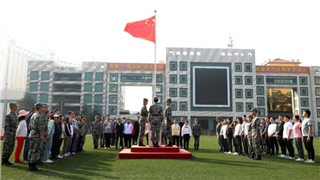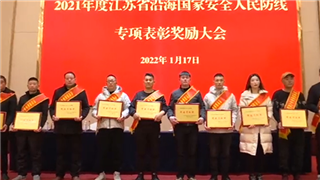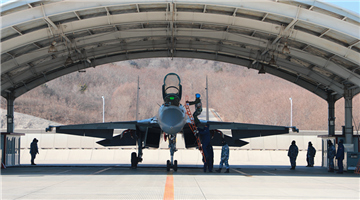项昊宇
By Xiang Haoyu
21日,日本首相岸田文雄同美国总统拜登通过视频方式举行首次会谈。日美宣布建立一个经济版的“2+2”机制,宣扬美日同盟的重要性,重申要加强“自由开放的印太”合作,对中国海洋活动和军力发展“表明关切”,强调“台湾海峡和平与稳定的重要性”。
Japan’s Prime Minister Fumio Kishida had his first meeting with the US President Joe Biden on January 21 through video link, at which the two countries announced to establish an economic version of the “two plus two” mechanism, reaffirmed the importance of the US-Japan alliance, and reiterated the necessity of strengthening their cooperation on creating a “free and open Indo-Pacific”. They also expressed concerns over China’s maritime activities and military buildup, and stressed "the importance of keeping the Taiwan Strait peaceful and stable".
尽管双方都三句话不离“同盟关系”,但这次美日首脑会谈前透露出的一些动向不禁让人产生疑问:日本还在美国的“核心小圈子”里吗?
Although both parties seemed to intentionally emphasize their alliance, the subtle signs leaked before the summit made people wonder whether Japan was still in America’s “core circle”.
时过境迁,当前拜登政府内外交困,对内面临中期选举压力,忙于应对通胀和支持率下降,对外因阿富汗撤军饱受批评,美英澳签署安全倡议(AUKUS)引发盟友内部裂痕。在此背景下,拜登政府对日本的关注也在下降。岸田上台以来谋求尽早访美却一直未果,日本国内有评论不无失落地指出,拜登政府在其全球战略中最为看重的仍是“盎格鲁撒克逊同盟”,日本已经掉到了“第二梯队”。
The Biden administration is deep in hot water now. Internally, it is busy handling inflation and the falling support rate with the nearing mid-term election; externally, it is slammed for the debacle of the withdrawal from Afghanistan, and the AUKUS it signed with Britain and Australia has driven a wedge among the allies. Against such a background, Washington is paying less attention to Japan, and Fumio Kishida’s attempt at an early US trip in his term of office went unanswered. There are comments in Japan pointing out, with much dismay, that the Biden administration still values the “Anglo-Saxon Alliance” most in its global strategy while Japan has been cast to the “second tier”.
从日方看,岸田和外相林芳正作为自民党内稳健派,在内外政策上有意与安倍晋三为首的右翼保守势力拉开距离,展现出改善近邻关系的意愿。在一些涉华敏感问题上,岸田面对右翼势力的强大压力,保持了基本的政策理性,未敢公然触碰中方红线。在新冠疫情及美国对华竞争打压背景下,中日双边贸易却逆势增长,凸显出中日经济联系愈发紧密的现实。新年伊始,《区域全面经济伙伴关系协定》(RCEP)的生效标志着中日首次实现自贸安排,将对中日乃至整个亚太经贸合作产生重要提振作用。与之形成鲜明反差的是,美方固执拒绝重返《全面与进步跨太平洋伙伴关系协定》(CPTPP),并打算另起炉灶搞“印太经济框架”,令日方感到无奈和失望。
On the Japanese side, as the moderates in the Liberal Democratic Party, Prime Minister Fumio Kishida and Foreign Minister Yoshimasa Hayashi want to keep a distance from the Shinzo Abe-led right-wing conservatives both on domestic and foreign policies, and have shown willingness to improve relations with the neighbors. Regarding some sensitive China-related issues, Kishida has basically kept sober-minded and stayed away from China’s red line despite the pressure from the right-wingers. With the COVID-19 still in the rage and America competing with and suppressing China, the bilateral trade volume between China and Japan has grown, attesting to their closer economic ties. The Regional Comprehensive Economic Partnership(RCEP) coming into effect at the beginning of the new year marked the first free-trade arrangements between China and Japan, which will pump a strong impetus into the economic and trade cooperation between the two countries and across the whole Asia Pacific. Posing a sharp contrast to this is America’s bigoted refusal to re-join the Comprehensive and Progressive Agreement for Trans-Pacific Partnership (CPTPP), and its plan to set up a new “Indo-Pacific economic framework”, which truly disappointed and hurt Japan.
目前看,至少还有三方面问题潜在影响着美日同盟的“向心力”。
Judging from the current situation, there are at least three factors that are eroding the US-Japan alliance.
一是疫情问题。最近日本国内新冠疫情呈现暴发性扩大,每日新增感染人数连创新高,而此波疫情的源头正是驻日美军。这也引发日本国内对于驻日美军特殊地位的严厉批评。
The first is the pandemic. Lately clusters of the COVID-19 breakout have been reported across Japan with the daily numbers of new infections hitting new highs constantly, and the source of this surge is American troops stationed in the country, drawing severe criticism of the special status granted to them.
二是核扩散问题。岸田上台以来重提“无核世界”倡议,推动日美联合发布有关《核不扩散条约》的联合声明,呼吁各国领导人访问广岛、长崎,并试图以核裁军问题加大对中俄的牵制。但另一方面,美英澳推进AUKUS却与此背道而驰,未来如果美方寻求与日本开展军用核技术合作,势必触动日本国内反核敏感神经。
The second is nuclear proliferation. After stepping in office, Kishida has re-approached the initiative for a “nuclear-free world”, pushed for a US-Japan joint statement on the Treaty on the Non-Proliferation of Nuclear Weapons(NPT), called on state leaders to visit Hiroshima and Nagasaki, and tried to ramp up the containment on China and Russia through nuclear disarmament. On the other hand, however, the AUKUS goes in exactly the opposite direction. If the US seeks to cooperate with Japan on nuclear technology for military purposes, that would definitely get on Japan’s anti-nuclear nerve.
三是基地问题。近来美日加快西南方向的军事部署,驻日美军频繁演训带来的扰民问题和安全风险加剧,使日本国内反基地情绪上升。在美方催促下,日本政府强行推进冲绳边野古美军基地建设,收购马毛岛用于建设美军舰载机基地,均引发当地强烈反对。
The third is the American military base in Japan. Recently the US and Japan have accelerated military deployments in the southwest, and the frequent exercises and training by American troops in Japan have disturbed local residents and increased security risks, fanning up the anti-US-base sentiments in the country. Prodded by the US side, Tokyo has forced the construction of the US military base in Henoko, Okinawa, and bought Mageshima to build a base for American carrier-based aircraft, both triggering intense local objection.
从深层次看,日美关系微妙变化的根源在于中美实力对比的加速演变。面对美国全方位打压,中国表现出强韧的抗压性。一些政策精英逐渐意识到,日本应正视中国崛起的现实,不可将全部身家“押注”美国,与美国的战略绑定需要留有余地,在中美间需要适当把握平衡。
On a deeper level, the subtle changes in the US-Japan relations have their roots in the accelerated shift in the China-US power structure. China has shown incredible resilience and tenacity in face of America’s all-out suppression, and some political elites have come to realize that Japan should look squarely at China’s rise and avoid putting all its bet on the US – it should leave some leeway in their strategic bond and keep the balance between the two major powers.
(作者是中国国际问题研究院亚太研究所特聘研究员)
(The author is a researcher at the Department for Asia-Pacific Studies, China Institute of International Studies)











